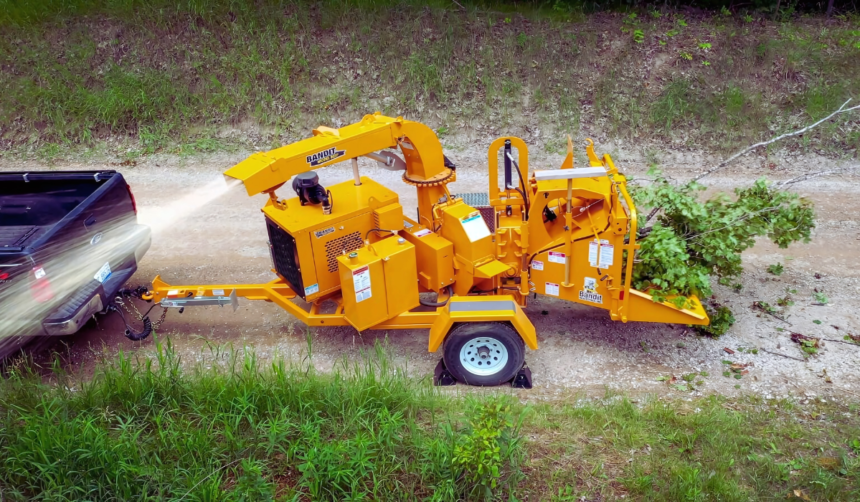SEO Meta Description:
Discover everything you need to know about wood chipper rental. From choosing the right equipment to safety tips, this guide covers it all. Perfect for your next landscaping project!
Introduction
When it comes to managing large amounts of yard waste, a wood chipper can be an invaluable tool. Whether you’re dealing with fallen branches after a storm, clearing land for a new garden, or simply tidying up your property, renting a wood chipper offers a cost-effective solution. But before you dive into wood chipper rental, it’s important to understand the ins and outs of the process. In this comprehensive guide, we’ll walk you through everything you need to know to make the most out of your rental experience, ensuring you select the right equipment and use it safely.
Why Choose Wood Chipper Rental?
Renting a wood chipper can save you both time and money, especially if you only need the equipment for a short period. Purchasing a wood chipper outright can be expensive, and unless you’re planning to use it frequently, the investment may not be worthwhile. With a wood chipper rental, you can access high-quality, professional-grade equipment without the hefty price tag. Additionally, you can choose from a variety of models and sizes, ensuring you have the right tool for the job without committing to long-term maintenance.
Types of Wood Chippers Available for Rent
Understanding the different types of wood chippers is crucial before making a rental decision. Generally, wood chippers fall into three categories:
- Electric Wood Chippers: Ideal for small jobs like chipping branches up to 2 inches in diameter. These are lightweight, easy to transport, and operate quietly.
- Gas-Powered Wood Chippers: Suitable for medium to large jobs, these machines can handle branches up to 4 inches in diameter. They are more powerful than electric models but require more maintenance.
- Commercial Wood Chippers: Best for large-scale projects or professional use, these heavy-duty machines can chip branches over 6 inches in diameter and are designed for continuous use.
When selecting a wood chipper rental, consider the size of the debris you’ll be processing and the scope of your project. This will help you choose the right type of chipper for your needs.
Factors to Consider When Renting a Wood Chipper
Before renting a wood chipper, there are several factors to keep in mind:
- Size of the Machine: Ensure the wood chipper rental is appropriate for the amount of debris you need to process. A machine that’s too small will slow you down, while one that’s too large can be difficult to handle.
- Power Source: Decide between electric and gas-powered models based on your project’s requirements. Gas models offer more power but require fuel and more maintenance, while electric models are easier to use and maintain.
- Safety Features: Look for chippers with essential safety features such as an automatic shut-off, emergency stop, and feeding control to prevent accidents.
- Rental Duration and Costs: Determine how long you’ll need the chipper and compare rental prices. Most rental companies offer daily, weekly, and monthly rates, so choose the option that best suits your timeline and budget.
How to Use a Wood Chipper Safely
Using a wood chipper rental requires careful attention to safety protocols to avoid injuries. Here are some tips to keep in mind:
- Wear Protective Gear: Always wear gloves, safety goggles, ear protection, and sturdy clothing when operating a wood chipper. Avoid loose clothing or jewelry that could get caught in the machine.
- Inspect the Equipment: Before use, thoroughly inspect the wood chipper for any damage or malfunctions. Check the blades, feeding chute, and power source to ensure everything is in working order.
- Follow the Manufacturer’s Instructions: Always read and follow the manufacturer’s guidelines for operating the wood chipper. Each model may have specific instructions and safety recommendations.
- Keep a Safe Distance: Maintain a safe distance from the feeding chute and ensure that bystanders are kept away from the machine during operation.
- Feed Slowly and Steadily: Feed branches into the chipper slowly and steadily to prevent jams. Avoid overloading the machine by feeding too much material at once.
Where to Find the Best Wood Chipper Rental Services
Finding a reliable wood chipper rental service is essential for a smooth and successful project. Here are some tips to help you locate the best rental providers:
- Local Hardware Stores: Many local hardware stores, like Home Depot or Lowe’s, offer wood chipper rentals. These stores typically have a range of models and sizes, and their staff can provide valuable advice on which machine to choose.
- Specialty Equipment Rental Companies: Companies that specialize in tool and equipment rentals often have a wider selection of wood chippers, including commercial-grade options.
- Online Rental Platforms: Websites like RentMyEquipment.com or HomeAdvisor can connect you with local rental providers. These platforms often feature customer reviews, helping you make an informed decision.
- Referrals and Recommendations: Ask friends, family, or neighbors who have rented a wood chipper before for recommendations. First-hand experiences can give you insight into the quality of service and equipment offered by different providers.
Preparing Your Yard for Wood Chipper Use
Before you bring your wood chipper rental home, it’s important to prepare your yard to ensure efficient and safe operation:
- Clear the Area: Remove any obstacles, such as rocks, toys, or garden tools, from the area where you plan to use the chipper. This will help prevent accidents and ensure smooth operation.
- Sort the Debris: Sort your yard waste into piles according to size. This will make feeding the wood chipper more efficient and prevent overloading the machine.
- Create a Disposal Plan: Decide what you’ll do with the wood chips once the job is done. You can use them as mulch, compost them, or dispose of them according to local regulations.
Common Mistakes to Avoid When Renting a Wood Chipper
Even with the best intentions, it’s easy to make mistakes during the wood chipper rental process. Here are some common pitfalls to avoid:
- Choosing the Wrong Size Chipper: Renting a chipper that’s too small or too large for your project can lead to inefficiency or even equipment damage. Make sure to select a machine that matches the scope of your project.
- Ignoring Safety Precautions: Failing to follow safety guidelines can result in serious injuries. Always wear protective gear and adhere to the manufacturer’s instructions.
- Overloading the Machine: Feeding too much material into the chipper at once can cause jams or damage the blades. Feed branches slowly and steadily to keep the machine running smoothly.
- Neglecting Maintenance: While rental equipment should be maintained by the provider, it’s still important to inspect the machine before use and report any issues immediately.
Wood Chipper Rental Costs: What to Expect
Understanding the costs associated with wood chipper rental can help you budget effectively for your project. Rental prices vary depending on the type of chipper, the rental duration, and the location. Here’s a general overview of what you can expect:
- Daily Rates: Small electric wood chippers typically rent for $50-$100 per day, while gas-powered models range from $75-$150 per day. Commercial-grade chippers can cost $200 or more per day.
- Weekly Rates: If you need the chipper for an extended period, weekly rates offer better value. Expect to pay between $200-$600 for a week, depending on the machine.
- Monthly Rates: For long-term projects, monthly rentals may be the most cost-effective option. Prices range from $600 to $2,000, depending on the chipper’s size and power.
FAQs About Wood Chipper Rental
What size wood chipper should I rent?
Choose a wood chipper rental based on the diameter of the branches you need to chip. For small branches up to 2 inches, an electric chipper is sufficient. For larger branches, a gas-powered or commercial chipper is recommended.
Is it difficult to operate a wood chipper?
While wood chippers are powerful machines, they are generally easy to operate if you follow the manufacturer’s instructions and safety guidelines. Beginners should start with a smaller, electric model.
Can I use a wood chipper for wet wood?
Most wood chippers can handle damp wood, but avoid feeding excessively wet or muddy branches into the machine, as this can cause jams and reduce the chipper’s efficiency.
How long should I rent a wood chipper for?
The rental duration depends on the size of your project. For small jobs, a day or two may suffice. For larger projects, consider renting the chipper for a week or more.
Do rental companies provide safety gear with the wood chipper?
Most rental companies do not include safety gear with the wood chipper rental. It’s important to bring your own gloves, goggles, and ear protection.
What happens if the wood chipper breaks down during the rental period?
If the wood chipper breaks down, contact the rental company immediately. Most companies will provide a replacement or repair service, depending on the issue.
Conclusion
Renting a wood chipper can be a game-changer for your landscaping and yard maintenance needs. By choosing the right equipment, following safety guidelines, and preparing your yard properly, you can efficiently tackle even the most daunting yard waste projects. Whether you’re clearing brush after a storm or preparing your garden for the season, a wood chipper rental offers a flexible and cost-effective solution to keep your property looking its best. Make sure to research and select the best rental service to ensure a smooth and successful experience.










